Britain Says Drone Circles Vessel In Gulf Of Oman After Strike On Tanker
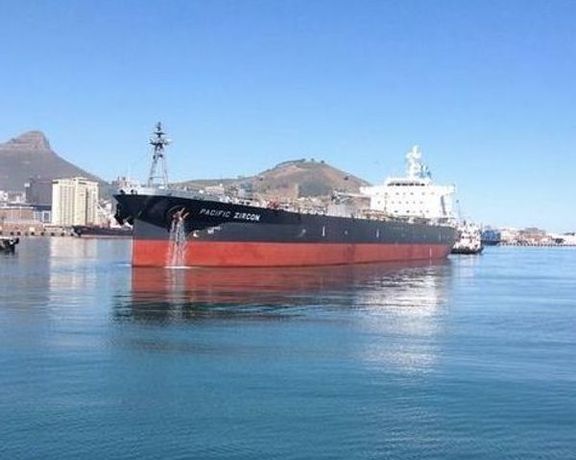
Britain's maritime agency said a drone circled a ship in the Gulf of Oman on Friday, three days after an Iranian-made drone attacked a tanker in the region.

Britain's maritime agency said a drone circled a ship in the Gulf of Oman on Friday, three days after an Iranian-made drone attacked a tanker in the region.
The Maritime Trade Operations (UKMTO), which is part of the Royal Navy, said the incident took place about 50 miles southwest of Muscat. The vessel and crew were reported to be safe. It did not specify what kind of vessel was involved.
The US Central Command said on Wednesday that an Iranian-made drone had attacked the tanker Pacific Zircon on Tuesday.
"This unmanned aerial vehicle attack against a civilian vessel in this critical maritime strait demonstrates, once again, the destabilizing nature of Iranian malign activity in the region," the Central Command statement said.
An Israeli official said Iran was responsible for the strike, while Iran's Nournews, which is affiliated to Tehran's security organization, blamed Israel and said the "Hebrew-Arab axis" aimed to create a "charged atmosphere" ahead the soccer World Cup that starts in Qatar on Sunday.
Pacific Zircon sustained minor damage with no injuries or spillage of the gas oil cargo, its operator, Israeli-controlled Eastern Pacific Shipping, said on Wednesday.
Attacks on tankers in Gulf waters in recent years have come at times of heightened regional tensions.
Reuters Report
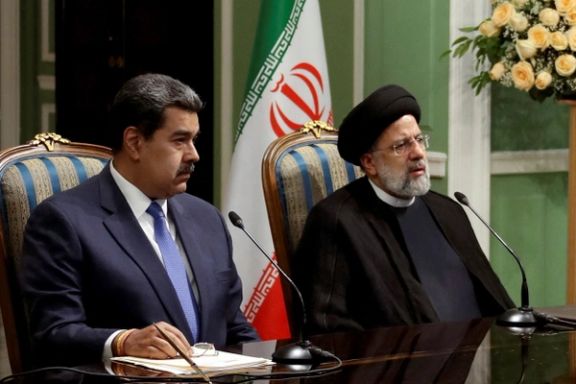
While the international community is restricting ties with the Islamic Republic over violence against protesters, Venezuela says it counts on Iran as an ally to bolster its independence.
"We have great friends in the world with a great scientific and technological capacity, the Islamic Republic of Iran, the People’s Republic of China, the Russian Federation, our brothers in India, Belarus," said the Venezuelan president during a speech on state TV Wednesday.
The ninth meeting of the Iran-Venezuela Joint Economic Committee was held in Tehran Tuesday during which Tehran and Caracas agreed for the expansion of ties in several fields.
Both countries are under American sanctions and try to sell their oil by illicit shipments mostly to China.
In June of 2022, Caracas and Tehran signed a 20-year cooperation plan which involves Iranian assistance in repair and maintenance of existing Venezuelan refineries, as well as other technical and engineering expertise.
While Venezuela enjoys what are believed to be the world’s largest petroleum deposits, years of mismanagement, corruption and maintenance issues have dramatically hampered its production and refining capabilities.
As the Iranian public persists with weeks of angry protests against the country's clerical regime, earlier reports from Tehran’s airport suggested some senior officials may have begun sending family members to friendly countries, including Venezuela.
Given Tehran’s relative lack of friends and allies around the world options for Iranian officials to travel to other countries are quite limited.
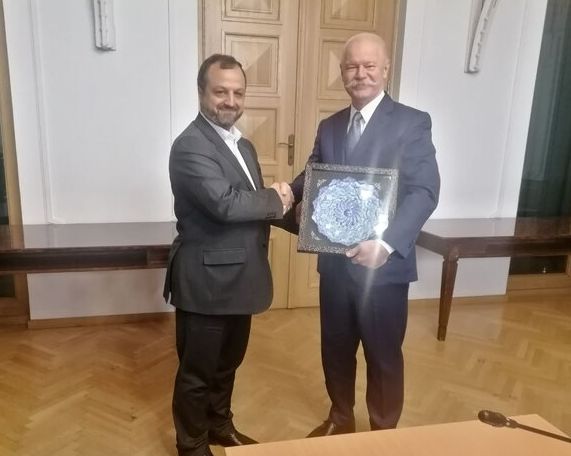
As Iran faces a serious shortage in medicines with some prices rising sevenfold, the Islamic Republic says it is ready to export medicines to Hungary.
Economy Minister Ehsan Khandouzi, who visited Budapest, said Thursday that Tehran is open to joint investment in pharmaceuticals as prices of Iranian products are “lower than foreign competitors.”
The visit and talk of economic cooperation come as Hungary is a member of Nato and EU while Iran is being harshly criticized by the European Union for using intense violence against protesters and supplying drones to Russia to attack Ukraine.
The minister’s claim comes as much of the raw materials needed for producing medicines in Iran is imported. The Islamic Republic is also dependent on imports for most of the drugs needed to treat life-threatening ailments such as cancer and coronary disease.
Most medicines in Iran are produced locally by quasi-governmental companies. When the Iranian currency began to nosedive in early 2018, the government offered a fixed exchange rate for essential goods, mainly food and medicines.
However, earlier this year, the new administration of President Ebrahim Raisi eliminated what was in fact a government subsidy. Now, food and medicine producers must buy dollars at rates seven times higher to import their raw materials, which has disrupted domestic production.
Reports from Iran say that people cannot even find painkillers, IV fluids, and antibiotics at pharmacies.

Social media users in Iran say following the designation of Abr Arvan company by the European Union many websites are not disrupted anymore and can be accessed easily.
According to digital activists, after the EU sanctioned Abrarvan, the company lost the servers it was using in Europe and is unable to censor Iran's internet anymore.
Arvan Cloud or Abr Arvan is an Iranian IT company supporting the Iranian government’s efforts to control access to the Intranet in Iran.
The European Union sanctioned the company on November 14 for its role in disrupting the internet to pave the ground for the regime to crack down on protests following the death of Mahsa Amini.
The EU says since 2020, Abr Arvan has been a major partner in the project of the Iranian government, in general, and the Iranian Ministry of Information and Communications Technology, in particular, to set up a separate, Iranian version of the internet.
“Such a national intranet with connecting points to the global internet will help to control the flow of information between the Iranian intranet and the global internet,” said the EU.
According to the EU, Abr Arvan is involved in censorship and efforts of the Iranian government to shut down the internet in response to recent protests in Iran.
“It is also associated with persons responsible for serious human rights violations in Iran, notably the EU-listed Iranian Minister of Information and Communications Technology.”
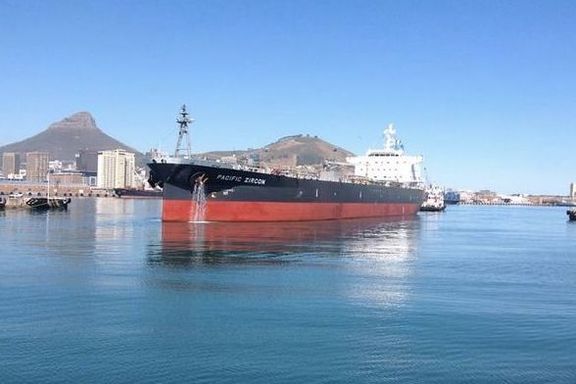
An attack on a tanker off the coast of Oman on Tuesday was carried out by an Iranian-made drone, US Central Command said in a statement on Wednesday.
It added that a multilateral maritime operation led by a British Royal Navy frigate had responded to the area.
An Israeli official had blamed Iran for the strike on the Pacific Zircon tanker managed by Israeli-controlled Eastern Pacific Shipping. The company said there was minor damage to the hull but no injuries or spillage of the gas oil cargo.
A White House official earlier said the United States was "confident that Iran likely conducted" the hit using an unmanned aerial vehicle. Iran's Nournews, which is affiliated with the country's top security body, blamed Israel for the attack.
US Central Command said in a statement that debris "reveals that it was a Shahed-series one-way attack drone" that hit the vessel, identifying it as Iranian-made.
"This unmanned aerial vehicle attack against a civilian vessel in this critical maritime strait demonstrates, once again, the destabilizing nature of Iranian malign activity in the region," the Central Command statement said.
It said a multilateral operation responded to the scene led by the British Royal Navy's HMS Lancaster. US Navy guided-missile destroyer USS The Sullivans and a US Navy patrol coastal ship and patrol craft were involved in the operation.
Attacks on tankers in Gulf waters in recent years have come at times of heightened regional tensions with Iran.
In July 2021, a suspected drone attack off Oman's coast hit a petroleum product tanker managed by an Israeli firm. Iran denied the accusations that it was responsible.
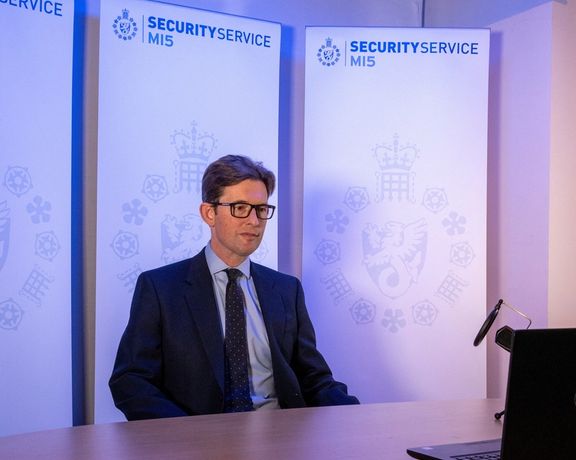
Britain’s MI5 has said Iran poses a major security threat for the United Kingdom as it uses “coercion, intimidation, and violence to pursue its interests.
MI5 Director General, Ken McCallum said Wednesday that except Russia and China, the Islamic Republic is a “mounting concern.”
During his annual threat update in Thames House, London, he underlined that Iran is a state actor which most frequently crosses into terrorism.
“Iran projects threat to the UK directly, through its aggressive intelligence services. At its sharpest this includes ambitions to kidnap or even kill British or UK-based individuals perceived as enemies of the regime,” added McCallum.
He went on to say that UK authorities have discovered at least 10 “potential threats” since January to “kidnap or even kill British or UK-based individuals perceived as enemies of the regime.”
Some UK politicians have demanded a tougher stance toward the clerical government in Tehran.
Elsewhere in his remarks, McCallum noted that “We work at pace with domestic and international partners to disrupt this completely unacceptable activity. The Foreign Secretary made clear to the Iranian regime just last week that the UK will not tolerate intimidation or threats to life towards journalists, or any individual, living in the UK.”
The UK summoned Iran’s ambassador last week as the regime is accused of threatening journalists working in Britain. The UK-based Iran International TV network said last week that two of its journalists had recently been notified of the threats.
In a statement Volant Media, the parent company of Iran International, said “The Metropolitan Police have now formally notified both journalists that these threats represent an imminent, credible and significant risk to their lives and those of their families. Other members of our staff have also been informed directly by the Metropolitan Police of separate threats.”
Speaking about the recent protests in Iran, UK’s top domestic security chief stated the regime is resorting to violence to silence critics who are asking fundamental questions of the totalitarian regime. However, he raised hope that this could “signal profound change, but the trajectory is uncertain.”
The current protests in Iran, which started in mid-September after Mahsa Amini, a young woman was killed in the custody of ‘morality police’, have lasted nearly two months, the longest and most serious challenge to the Islamic Republic, which has one of the largest trained and well-equipped suppression machines in the world.
So far, security forces have killed more than 340 protesters, according to human rights monitors and arrested an estimated 14,000 people. Just during protests on Wednesday around 10 protesters and bystanders were killed.
During his Wednesday comments, McCallum also blamed Iran as a regime that with its proxies, remains a profoundly destabilizing actor in its region and beyond, adding that the Islamic Republic provides support to Russia, including by supplying the drones inflicting misery in Ukraine.